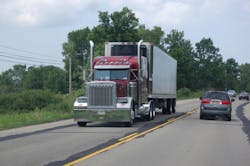High school grads: the "new" recruits for trucking?
Yet the flip side of their research, detailed in this recent CareerBuilder survey, indicates that transportation-related jobs may offer the best employment option for high school grads – and that could help trucking begin to solve some of its long-term worker issues, especially where truck drivers are concerned.
This isn’t a “slam dunk” issue, mind you: as we all know, only those 21 and over can hold commercial driver’s licenses (CDLs) and that rule isn’t going to change anytime soon. Some motor carriers – as this story from two years ago illustrates – are trying to fill their empty seats with workers gleaned from its docks and terminals.
Some are also going so far as to open their own truck driver schools and are actively looking for high school graduates – a trend exemplified by this note posted by regional carrier from A. Duie Pyle.
Thus, though the supply of drivers currently remains short by some 30,000, according to data tracked by the American Trucking Associations (ATA), the longer-term trend of employers viewing an associate or bachelor’s degree the way they used to view high school diplomas as a hiring prerequisite may help the industry down the road.According to a broad CareerBuilder survey of 2,201 hiring managers and human resources professionals conducted for the firm by the Harris Poll at the end of 2013, some 27% of employers say their educational requirements for employment have increased over the last five years and 30% are hiring more college-educated workers for positions that were previously held by high school graduates.
The rising bar is even extending beyond the bachelor’s degree in some cases, CareerBuilder found, with one in five employers (20%) are now targeting Master’s degree holders for positions previously held by those with four-year degrees. A third (33%) of employers are even sending current employees back to school for an advanced degree, with a majority of that group (81%) are at least offering partial funding.
“The economic value of a college education for workers has long been known, but as occupations evolve and as companies rely more heavily on professionals with strong interpersonal and technical skill sets, workers can’t afford to stop their education at high-school,” noted Matt Ferguson, CEO of CareerBuilder.
On top of that, 84% of those companies that hire college-educated versus high-school-only applicants cite at least one positive impact, including:
- Higher-quality work: 56%
- Productivity: 45%
- Innovation/Idea generation: 41%
- Communication: 41%
- Employee retention: 27%
However, one end result of this shift is that U.S. workers with only a high school diploma face an unemployment rate nearly twice that of college educated workers (6.1 to 3.1) and earn significantly less on average.
Thankfully, despite this disparity, workers without college degrees do have options for what CareerBuilder calls “lucrative careers” with transportation at the top of the list.
|
Occupation |
Med. Hourly Earnings |
2014 Jobs |
2010 - 2014 Growth |
On-The-Job Training |
|
Transportation, Storage, and Distribution Managers |
$39.27 |
104,095 |
7% |
None |
|
First-Line Supervisors of Non-Retail Sales Workers |
$34.27 |
252,593 |
6% |
None |
|
Gaming Managers |
$31.99 |
5,131 |
1% |
None |
|
Real Estate Brokers |
$29.48 |
51,154 |
6% |
None |
|
First-Line Supervisors of Construction Trades and Extraction Workers |
$29.20 |
496,262 |
9% |
None |
|
First-Line Supervisors of Mechanics, Installers, and Repairers |
$29.13 |
442,191 |
6% |
None |
|
Legal Support Workers, All Other*** |
$26.97 |
52,754 |
-1% |
Short-term |
|
Postal Service Mail Carriers |
$26.75 |
283,715 |
-10% |
Short-term |
|
Transit and Railroad Police |
$26.71 |
4,439 |
1% |
Short-term |
|
Property, Real Estate, and Community Association Managers |
$26.00 |
170,463 |
7% |
None |
"While the pursuit of higher education is the best bet for gainful employment, it is a myth that only good jobs go to college graduates and that workers with high school degrees are destined to low-wage careers," stressed Rosemary Haefner, VP- human resources for CareerBuilder.
“It's important to note, however, that most high-paying jobs available to high school grads involve skill sets that require extensive post-secondary training or several-years' worth of prior experience, and are often in fields that have seen declining employment in recent years,” she added.
This data by no means indicates trucking’s driver shortage issue will be easily solved. But it does indicate that broader employment trends within the U.S. business community may help make trucking more attractive to workers being shut out – fairly or fairly – from other job opportunities based on their level of education.



